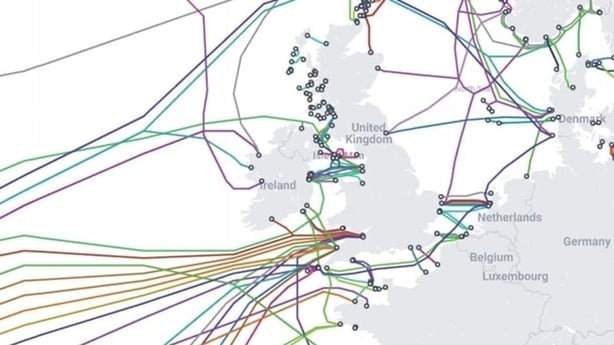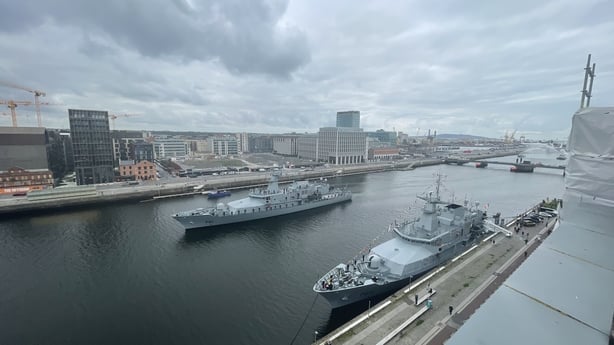A new maritime security unit has been set up at the Department of Defence to look at ways to address maritime threats and risks to Ireland.
The body, which was established at the end of last year, will lead the development of Ireland's first National Maritime Security Strategy, according to documents seen by RTÉ News.
Dr Margaret Stanley, who previously led the Office of Emergency Planning in the Defence Department and worked on peacekeeping matters at the United Nations in New York, has been appointed to head the unit.
In recent remarks to the Marine Renewables Industry Association, Dr Stanley said the new maritime strategy will be prepared in cooperation with national and international stakeholders and will include "extensive" engagement with the private sector.
Dr Stanley added that Ireland's geographic position is part of the reason why this kind of security work is being prioritised.
Safeguarding undersea cables
Ireland’s maritime footprint is seven times the country's land area and it is home to the majority of transatlantic data communications.
One of the biggest concerns is the safeguarding of these undersea cables which keeps everything from banking systems to TikTok operating.

Most go through or close to Ireland and they have become increasingly attractive targets for military and criminal actors. Approximately three quarters of Ireland's natural gas is also imported via undersea gas pipelines.
In November 2023, then tánaiste Micheál Martin announced the intention to devise a National Maritime Security Strategy.
The Department of Defence told RTÉ News last month that it is not in a position, at this stage, to say when the strategy will be completed and approved by Government.
No urgent timeline 'problematic'
Dr Edward Burke, Assistant Professor in the History of War at University College Dublin, welcomed the establishment of the unit but said it is 'problematic' that there is no urgent timeline for the delivery of the strategy.
"I think the threats that we see off the Irish seaboard now are so intense and obvious, not only to us but to the European Union, to other security partners including the UK. We've seen a lot of Russian activity off the west and east coast of Ireland. We've seen Russian spy vessels, clearly surveying our critical national infrastructure, subsea cables for weaknesses. We need to get on top of that," he said.
"We need to invest in capabilities, not least when it comes to surveillance vessels. Some of that could be done quite quickly. For example, the UK and other European states have refitted scientific research vessels so they can more easily detect subsea threats to subsea infrastructure that may come from state or non-state actors," Dr Burke said.
"I'm a bit concerned that if we push this out to do another wide-ranging review that goes on for months then we may not be approaching this issue with the urgency that it requires," he added.
Increased defence funding
Recent increased defence funding hopes to facilitate the progress of defence projects such as military radar and subsea awareness.
The Government has said that 2025's spending on defence is a record €1.35 billion and a further increase is planned for next year.
Figures from the Department of Defence, given to and analysed by RTÉ News, show that Ireland's defence spending, when relative to GDP and GNI, decreased every year between 2013 and 2023.
In 2013, Ireland spent 0.5% of its GDP on defence or €890 million, compared with 0.2% or €1.2bn in 2023.
Read more: Defence budget should reach highest level of €3bn, says Tánaiste
However like other European nations, the Government plans to ramp up spending to €1.8bn annually by 2028.
Tánaiste and Minister for Defence Simon Harris said in February that he has instructed officials in the department to prepare a more aggressive procurement strategy for acquiring new military capabilities.
This includes the acquisition of interceptor jets, as well as radar and sonar capabilities to allow the skies and seas to be monitored by Ireland's Defence Forces.
Although there are plans to procure new equipment, there are concerns over a lack of specialist personnel needed to operate them.
For instance the current naval fleet comprises of six vessels. However, only one or two ships are out at sea due to staffing shortages.
The plan is to bring the division to a nine ship navy.
Naval retention and recruitment struggles
With struggles to recruit and retain staff within the Defence Forces, Lieutenant Commander Grace Fanning, who serves with the Naval Service, said the navy is actively seeking new recruits.
"We need people. Obviously there is no point in having all this capability if we don't have the expertise to run the ships," she told RTÉ News.
"Electricians, communications operatives, engine room artificers. They're all pinch points at the moment," said Lieutenant Commander Fanning.
"We really need to get them to get our ships to go out and to protect our critical infrastructure, undersea cables and ensure there [are] no rogue vessels, dark vessels operating in our area. We need to be out there. We need to be able to see what's going on," she said.

Specialist training can take years while there can also be a long lead time for the procurement of new equipment.
Airline captain and former Air Corps officer, Kevin Phipps said there are no overnight fixes to the issues.
"I do think there are green shoots and I do think if there is one lesson I learned from my time in the military is that if the Defence Forces are given the proper resources they are well able to solve all these complex problems," he said.
"It's not going to happen overnight and these projects that the government may embark on are highly complex and have huge lead times. They are not going to be solved without the people, without the money and without the political will to tackle them," he added.







